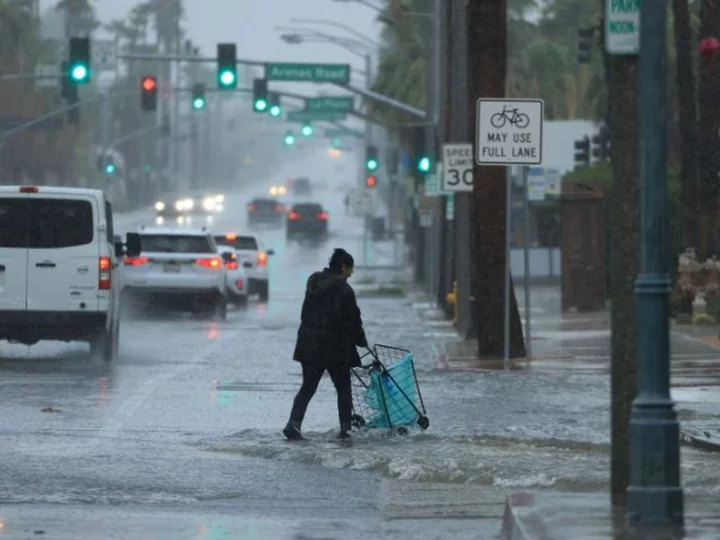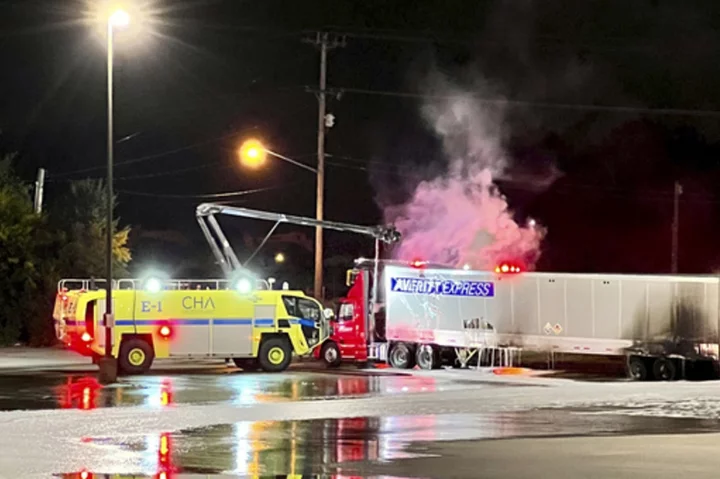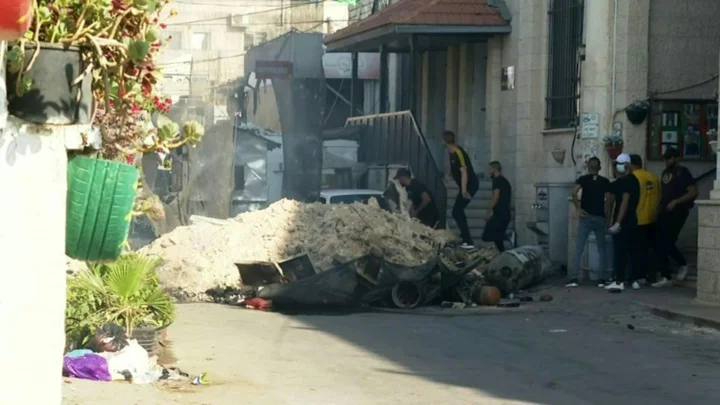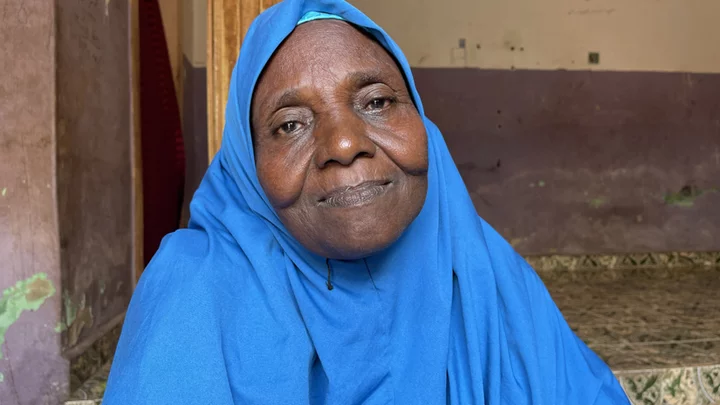Tropical Storm Hilary is pushing into Southern California with fierce winds and heavy downpours as residents face downed powerlines, flooded streets and rescues needed.
Hilary is forecast to continue to move north through California and dissipate over central Nevada on Monday, bringing "potentially historic" rainfall amounts along the way that could trigger more floods, landslides and debris flows, according to the National Weather Service.
"Areas that normally do not experience flash flooding will flood," the National Weather Service said. "Lives and property are in great danger through Monday."
The storm could potentially be the first tropical system on record to strike Nevada.
It could also wreak havoc farther north. Rainfall up to 5 inches is possible across parts of Oregon and Idaho through Tuesday morning. This rainfall could lead to catastrophic and life-threatening flooding.
Once a hurricane, Hilary weakened as it made landfall in Mexico Sunday, where at least one person died, then it crossed over into the Golden State. The storm's center was roughly 10 miles southeast of downtown Los Angeles around 8 p.m. local time Sunday, moving north with weakened 45 mph winds, according to the National Hurricane Center.
It's the first time a tropical storm has made landfall in the Baja Peninsula of Mexico and continued north into California since Nora in 1997.
Live updates: Tropical Storm Hilary to bring major flooding risk to California
While the storm has weakened significantly, it's still battering California with extreme weather as it moves farther inland, bringing continued fears that floods and mudslides could potentially turn deadly.
"We are not used to this level of precipitation, generally. Certainly not in the middle of summer," San Diego Mayor Todd Gloria told CNN's Jim Acosta Sunday.
"With what we're expecting, it may overwhelm us," he added.
There have already been widespread reports of flooding, mudslides and downed trees and wires across Southern California -- and the threat remains Monday.
The National Weather Service said parts of Los Angeles and Ventura counties were experiencing "dangerous flooding" Sunday evening, with cars stuck in floodwaters in the Spanish Hills area.
More than 7 million people, including those in downtown Los Angeles, are under a flash flood warning through early Monday morning. Parts of Los Angeles and Ventura counties could see up to 1.5 inches of rain dumped per hour, the National Weather Service has said.
The storm has led to disruptions across Southern California, with many parks, beaches and other locations closed as officials called on residents to stay indoors.
The Los Angeles Unified School District -- the nation's second largest school district -- will be closed Monday because of Tropical Storm Hilary. So will campuses in the Pasadena Unified School District and the San Diego Unified School District, officials there announced.
And as Hilary triggered flood warnings across Los Angeles, a magnitude 5.1 earthquake shook the area and other parts of Southern California Sunday afternoon, according to the United States Geological Survey.
Nearly a month's worth of rain in 1 hour
California had been preparing for difficult conditions, positioning first responders across southern California to brace for water rescues in flood-prone areas like wildfire burn scars and deserts. The fear is that areas unaccustomed to rain could suddenly receive a year's worth or more, triggering flash floods and landslides.
Already, rainfall totals have been significant:
Multiple daily and monthly rainfall records were broken Sunday, with 1.53 inches falling in downtown Los Angeles, 1.56 inches in Long Beach and 2.95 inches in Palmdale, according to the weather service.
Palm Springs -- where three main roads into the city were closed and a local emergency was declared -- received half a year's worth of rain in just a six-hour period, with 2.27 inches recorded at the Palm Springs Airport on Sunday, according to the National Weather Service.
There have been at least three swift water rescues so far in Palm Springs, police department lieutenant Gustavo Araiza told CNN.
Death Valley saw triple its average August rainfall in just a few hours Sunday morning. Nearly a month's worth of rain fell in one hour on Sunday. It normally receives an average of 0.21 inches of rain the entire month of August, but the Furnace Creek observation site reported 0.63 inches since Sunday morning.
Santa Clarita, about 30 miles north of Los Angeles, experienced steady rain for about ten hours, with the storm dropping well over four inches of rain on the valley. Parts of Sand Canyon Road could be seen falling into rushing water.
In San Bernardino County, residents of Oak Glen, Forest Falls, Mountain Home Village, Angelus Oaks, and Northeast Yucaipa were all ordered to evacuate Saturday.
By late Sunday, the National Weather Service had sent a mass alert to cell phone users in parts of the county saying,"Do not attempt to travel unless you are fleeing an area subject to flooding or under an evacuation order."
San Bernardino Fire Battalion Chief Mike McClintock said evacuation orders are meant to help residents escape areas that may face serious flooding, and that warnings should be heeded immediately.
"If we ask you to evacuate, we don't take that lightly," McClintock said in an interview with CNN. "We're asking you based on predictions and concerns, and we want you to get out sooner rather than later."









